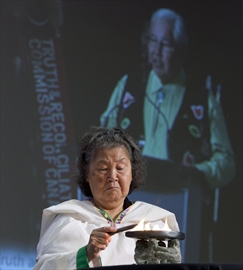Head of Trc Urges Canadians to Confront Ugly Truth of Residential Schools
By Bruce Cheadle
The time for frank apologies for Canada's treatment of its first peoples is over and must make way for a change in behaviour, the chair of the Truth and Reconciliation Commission said on the eve of his long-awaited report's release. "Truth and apologies are achieved through words, important words, yes," Justice Murray Sinclair said Monday. "But the next step, reconciliation, is achieved only by acting differently." Five years and $60 million have gone into the six-volume study of Canada's residential schools, which were established in the 1840s to "take the Indian out of the child" and lasted until the '90s. Prime Minister Stephen Harper kicked off the long reconciliation process with a moving apology from the government of Canada in the House of Commons in June 2008, with the commission getting off to a wobbly start the following year. The original cast of three commissioners all resigned before the project hit its stride, eventually visiting hundreds of communities and hearing testimony from 7,000 survivors. "Many survivors' stories remain difficult to hear, or even to comprehend," Sinclair said of the litany of physical, sexual and mental abuse that too often characterized residential schools. "But we cannot permit discomfort to prevent us from accepting the truth. Rather, it should set the course towards our actions in future." About 150,000 First Nations, Inuit and Metis children were taken from their families and forced to attend residential schools, with some 80,000 still alive today. The report by Sinclair and fellow commissioners Marie Wilson and Wilton Littlechild chronicles their stories and will provide a lengthy list of recommendations. Education — sharing the story of the country's dark past — is expected to feature prominently. "There can be no reconciliation without education," Jason Lafferty, the education minister for the Northwest Territories, told a gathering at a downtown hotel that included hundreds of residential schools survivors. The territorial government has already developed and implemented the first comprehensive curriculum covering the history of residential schools and their legacy and it is in talks with other provincial education ministries about sharing the program nationally. "We're willing to offer training in school settings for teachers that are going through the trauma when they're teaching, because it is very emotional and a very sensitive topic to talk about," Lafferty said in an interview. As he spoke, a woman nearby broke down, keening loudly that she had lost her son and no longer knows whether he's alive or dead. It was a pointed reminder of the raw emotions that lie just beneath the rather celebratory atmosphere of four days of events surrounding Tuesday's report release. Imparting that message to the wider Canadian public is the next challenge for the Truth and Reconciliation Commission. Celebrated author Joseph Boyden was inducted as an honorary witness Monday, along with Sharon Johnston, the wife of the Governor General. Some 80 such honorary witnesses are charged with carrying the commission's message out to the world. It's going to be a generational job, Boyden said in an interview. "Today and the week that's coming does not suggest that everything is done. Things are just beginning in terms of speaking to Canadians about our history." Boyden said his next novel will deal indirectly with the fallout from residential schools. Perry Bellegard, the national grand chief of the Assembly of First Nations, delivered much the same message, but he's clearly in a greater hurry, pointing to this October's federal election as a pivotal point. "If we do a more effective job of educating the Canadian public, there will be such a groundswell of support for change that, no matter who gets in (to government) on Oct. 19, they will have to deal with this shared history," Bellegard said at a news conference. Harper will attend events Wednesday that wrap up four days of ceremonies in the capital surrounding the release of the report. The Canadian Press
|
.
Any original material on these pages is copyright © BishopAccountability.org 2004. Reproduce freely with attribution.
